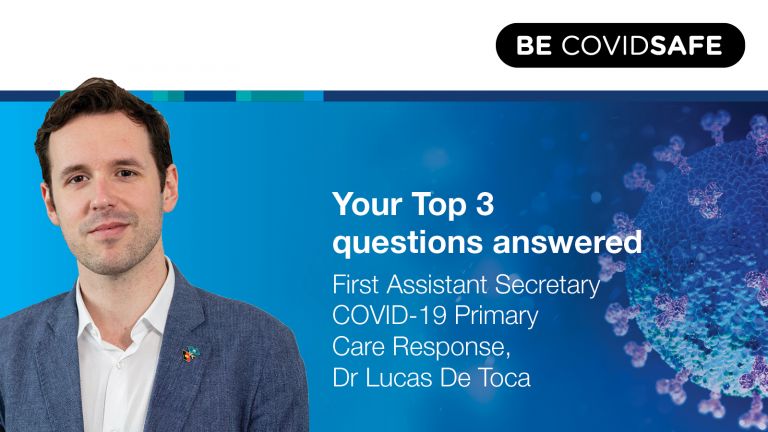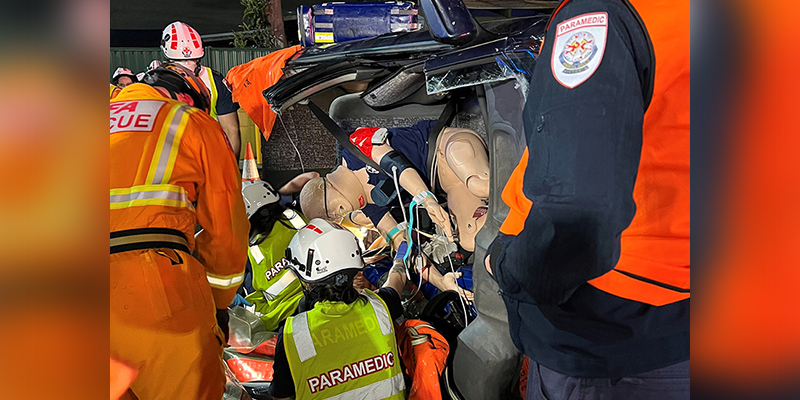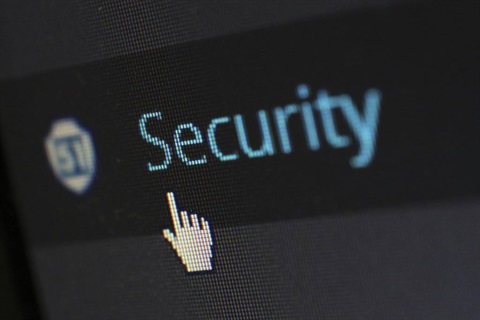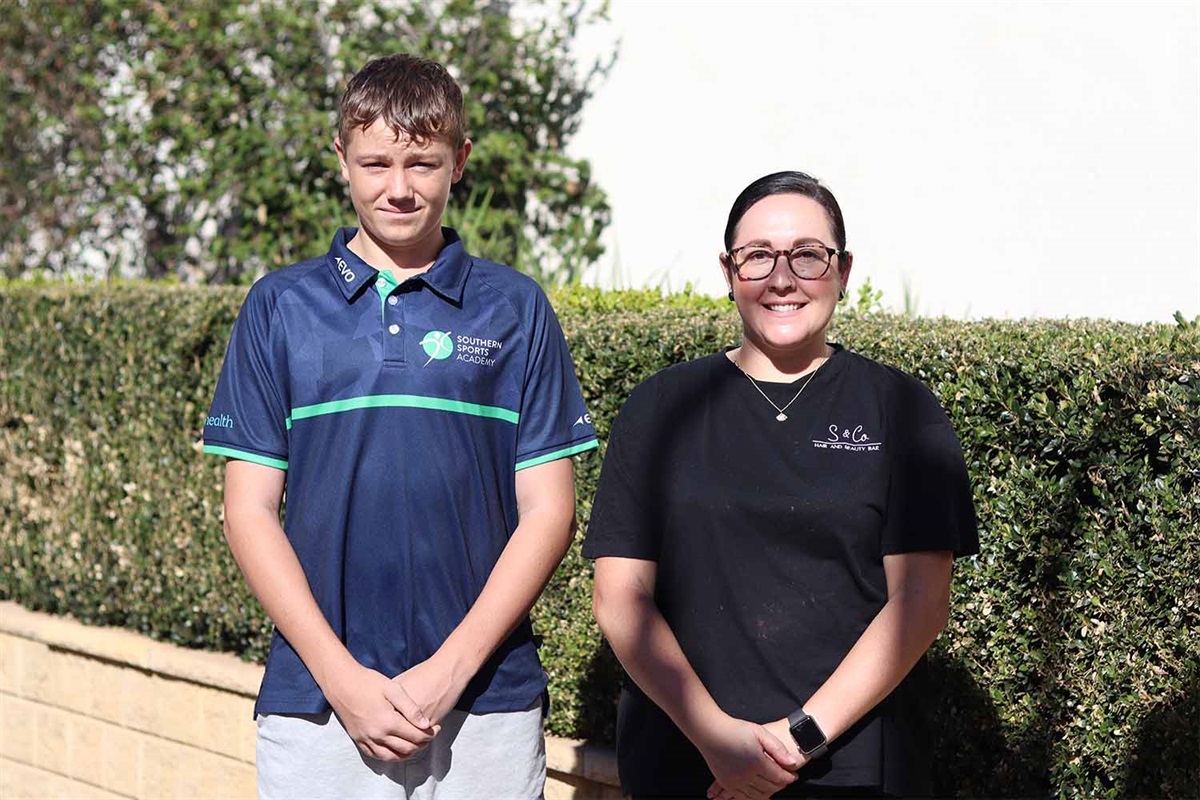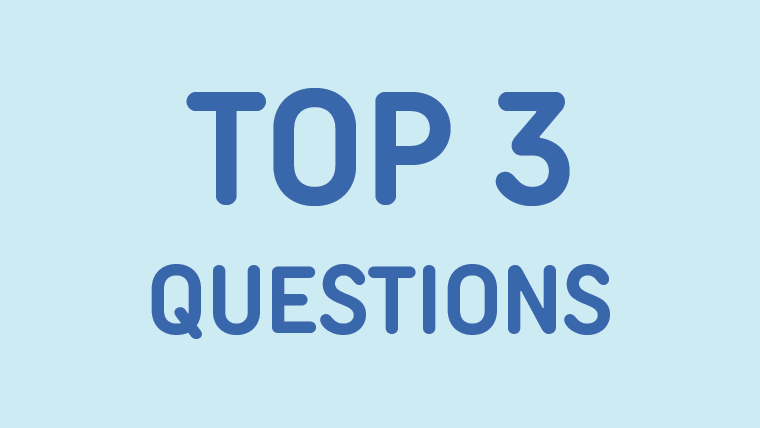
Good morning. My name is Doctor Lucas De Toca and today we are going to be answering the questions that you have been asking through our social media channels. As usual, I’m joined by Linda, thank you, who will be doing Auslan interpreting. We’re on the land of the Ngunnawal people, so Dhawra nhuna, dhawra Ngunawal. Yanggu gulanyin ngalawiri, dhunayi, Ngunawal dhawra. Wanggarralijinyin mariny balan bugarabang. I also acknowledge the Traditional Owners of the lands from where you may be watching. We are going to talk today about rapid antigen testing and when it is used, we are going to talk about vaccines and other medications, and we are going to talk about the side-effects of vaccines and how do we know whether the vaccine has worked or not. Hopefully you will find this segment interesting. But before starting, I want to shout out to the teachers of the schools and the parents that are across the eastern seaboard, who are going to be seeing their kids in different years returning to school. Lockdowns are incredibly hard on everyone, but especially families with young kids that have to deal with all of the different bits and working from home, while at the same time supporting homeschooling, and for the children themselves, of course. So congratulations to all of those families whose kids are now gradually going to return to face-to-face education.
So the first question today is about rapid antigen testing. What is it and how accurate it is?
A rapid antigen test is a test that can give results of whether someone has presence of the virus that causes COVID in a short period of time, as the name says. It is a test that functions and is primarily useful for people who don’t have symptoms and the basics of how it is operating is not that dissimilar to the swab that you get for a PCR, or the standard laboratory test that you get for COVID. So it is a nasal swab using a cotton bud, like for other tests, and then that is inserted into a chemical solution that is then placed into the device that performs the rapid antigen test, and you can get a result within 15-20 minutes, which is really convenient. Unlike the standard laboratory test, the PCR or polymerase chain reaction test, it doesn’t look for the genetic material of the virus, but it looks for a number of key components of the virus. So as a result of that, it is less sensitive than the standard test. It has a high chance of missing an infection than the standard PCR test does. That is why rapid antigen tests are not used as the gold standard test to determine whether someone with symptoms has COVID or not, and they are preferentially used for larger screening-type programs in asymptomatic people, people without symptoms. It has been used quite broadly internationally, there are many types of rapid antigen tests, and in Australia, certain industries have used it as part of the frequent occupational testing, so people who, as part of their job, need to get tested very frequently, daily or every couple of days, a lot of industries have moved to doing so with rapid antigen tests, and the laboratory-based or testing site-based PCR test remains as the gold standard for people with symptoms and for confirming any results from the rapid antigen test. The Therapeutic Goods Administration, or TGA, is looking at further regulation for the use of rapid antigen tests in Australia, and it is likely that as we move out of lockdowns and into our very vaccinated population, rapid antigen tests will play a bigger role in the future in the toolbox that we have to manage COVID in the community.
The second question for today is, I’m on medication can I get the COVID-19 vaccine, or do I have to be worried about the medication and the vaccine interacting?
The key message here is that generally, COVID-19 vaccines will not interfere with medication, and there are no known interactions with COVID-19 vaccines and any prescription or over-the-counter drug. However, regardless of this, as always, it is really important that you talk to your health professional, your regular doctor, and your immunisation provider, the clinician that is administering the vaccine to you, and disclose any medication that you are on, including over the counter products or vitamin supplements, things that you take out of habit, so that they can consider that in the context of your vaccination. It is important that you have a chat with your doctor if you are on regular medication so they can let you know whether there is anything to think about. And there may be some things, like people on blood thinning medication, it is important that they let their immunisation provider know so that they know they need to apply more pressure after the injection, because your tendency to bleed may be heightened by your blood thinning drugs. People who are on medications that weaken the immune system, like chemotherapy, should discuss that with their doctor or treating clinician, they will be able to advise on the timing of the vaccine based on the timing and schedule of the treatment. Again, you can get the vaccine, but it is more about how you time it so that you maximise the effect of the vaccine. The general rule, as always, is to talk to your treating clinician to discuss those concerns and to make sure that your individual circumstances are taken into consideration, and to disclose any medication that you are on to the immunisation provider that is actually giving you the vaccine. Finally, the Australian Technical Advisory Group on Immunisation, ATAGI, recommend to keep seven days in between the COVID-19 vaccine and any other vaccine. That also helps us understand whether side-effects are related to one vaccine or another. So as a general rule, but if you are concerned talk to your health care provider, you need to wait seven days between your flu vaccination and your COVID-19 vaccine, or other vaccinations.
The final question for today is, how do I actually know that the vaccine has worked on me?
The broad answer is that we don’t have an immediate way to tell at an individual level whether the vaccine has worked or not, but the vaccines are incredibly effective, they overwhelmingly work and have a significant impact, an almost 10-time reduction of the chance that you would get severe disease, hospitalisation or death from COVID-19. Many people, and it’s very common, have some side effects, mild or moderate side-effects from the vaccines. Feeling a little bit tired, pain at the injection site, a short-lived fever or a bit of a temp, they are the kind of side-effects that some people often get with flu vaccine or other vaccines, and they seem to be common with COVID-19 vaccines. That is just a marker that your immune system is responding to the components of the vaccine and learning how to fight the virus, mounting a response that then will allow your immune system to fight the virus if you get into contact with it. That is how vaccines work. However, while those side-effects are nothing to worry about and they just show you your immune system is responding, it doesn’t mean that if you don’t have those side-effects that vaccine is not working. We really don’t know yet why some people do get side-effects and some don’t. People tend to get more side-effects with the second dose of the Pfizer or Moderna, and with the first dose of AstraZeneca. But it varies, and some people get side-effects with both, some don’t get side-effects with either. I had a pretty sore shoulder with my second vaccine, but I had no systemic side-effects. I didn’t have tiredness, or fever, or anything. Whereas some people that I know felt pretty under the weather for maybe the day after. Whether you have side-effects or don’t, you can be reassured, that the vaccine in the immense majority of cases works and works really well. We do know that people who have weakened immune systems, who are immunocompromised, whether because they have an antibody deficiency or some condition that means their immune system is somewhat weakened, or more commonly because they are on medication that weakens the immune system, organ transplant recipients, people on chemotherapy or radiotherapy, people on immunosuppressant drugs like high levels of anti-arthritis drugs, may require more than two doses, a third dose, to mount up the same level of immune response that someone who is not immunocompromised achieves with two doses. In those cases, and we’re talking about a very small portion of the population, probably about half a million out of the 21 million people who are eligible for the vaccine in Australia, ATAGI, the technical advisory group on immunisation, recommends they get third dose of a COVID vaccine between two and six months after they had their second dose. It is not necessarily a booster as part of the overall booster approach that medical experts are still considering, it is just to try to get as much protection with three doses as someone who is not immunocompromised gets with two. So if you are on active chemotherapy treatment, radiotherapy, you are concerned about your immune system and you know that you have a weakened immune system, or that you are in an immunosuppressant treatment, please talk to your doctor, they can provide you with advice on whether a third dose is appropriate to you. But please remember we are talking about people who are severely immunocompromised, a very small proportion of the population. Not everybody who is on drugs like anti-arthritis, or not everyone who may have had cancer in the past would be in this group, so just talk to your doctor or health professional, and they will know your history and will provide advice that is appropriate to you.
That is all we have for today. I hope it was helpful. Thank you for continuing to send your questions and your comments. Thank you for continuing to practise COVIDSafe behaviours and for tuning in. See you next time.
Top 3 questions
- What is a rapid antigen test and how accurate are they?
- I’m on medication – will the COVID-19 vaccine affect this?
- How do I know if the COVID-19 vaccine has worked?

